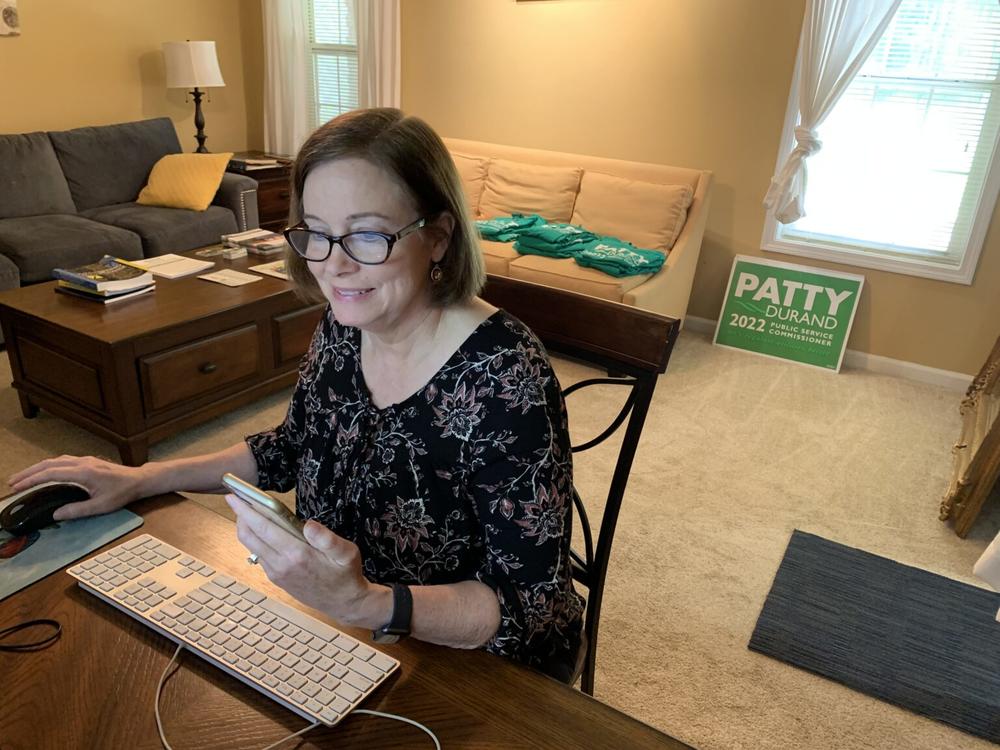
Caption
Patty Durand, the Democratic nominee for the Georgia Public Service Commission, makes fundraising calls from her home in Conyers on June 8.
Credit: Jill Nolin/Georgia Recorder

Patty Durand, the Democratic nominee for the Georgia Public Service Commission, makes fundraising calls from her home in Conyers on June 8.
The fate of Patty Durand’s campaign to serve on a state board that regulates Georgia’s utilities rests in the hands of a judge, but that uncertainty isn’t slowing down the first-time candidate who was drawn out of a district she hopes to represent.
On a recent afternoon, Durand sat in front of a computer inside the Conyers home she moved into a few months ago and called on donors who have given to her campaign in the past, just as she does every afternoon.
“Did you see the good news that I won the primary?” she said cheerfully to one donor before adding that she had to “dodge a bunch of ninja stars” to stay in the race. “Hang in there,” the donor says in response.
Durand, a Democrat who has worked as a consumer advocate, has in fact faced a series of hurdles to remain a candidate. And there’s no guarantee now that she will ultimately face incumbent Republican Commissioner Tim Echols in the fall, though she has pledged to help a party-nominated replacement candidate should it come to that.
But in her mind, her campaign is not in any kind of limbo. Durand is plugging away at her fundraising goals to fuel her campaign in the months ahead. She has reported raising a total of $142,000 as of last month.
Bright green campaign T-shirts were neatly folded on her couch, ready to be deployed on the backs of supporters, and thick stacks of campaign literature explaining the job of the Georgia Public Service Commission and her case against the status quo sat on her coffee table. To reach younger voters, she has recently started dabbling in TikTok videos about climate change and utilities behaving as monopolies.
“I’m the nominee. Until I lose in court, I’m running this campaign as though there is a campaign because otherwise, they win,” Durand said in an interview. “I have to run this campaign, raise money, talk to donors, talk to voters, and continue to focus because losing focus is exactly what they want. And I’m not going to give them that.”
Durand has also launched a political action committee called People Over Profits that will focus on raising funds for her legal expenses.
“This is really not about me. This is about the people of Georgia deserving a fair chance at electing somebody that is going to protect their interests,” Durand said.
Durand publicly announced her candidacy last July with plans to put Echol’s support for the expansion of Plant Vogtle nuclear power plant at the center of her campaign.
The project is years behind schedule and billions of dollars over budget, and the Public Service Commission will have a say in how much of the cost is passed along to ratepayers.
At the time, Durand had recently settled into a home in Gwinnett County after relocating from Fulton County, which is a move she says she made for reasons beyond her political aspirations. A PSC candidate must live in a district for a year to be eligible to hold office.

Macon Republican Sen. John Kennedy defended a new district map for the Public Service Commission against accusations that it was redesigned to favor an incumbent up for election and that the statewide elections should be reformed.
But when state lawmakers redrew the commission’s five districts earlier this year as part of the once-a-decade redistricting process, Republican mapmakers sliced Gwinnett County — a county of nearly 1 million people – out of District 2. At the time, GOP lawmakers said the changes were made because of population shifts and not because of politics.
Durand then picked up and moved to a subdivision in Rockdale County, making a second move in a year. That is not enough time to satisfy the 12-month residency requirement, but Durand says she made the move to give her standing in court.
Republican Secretary of State Brad Raffensperger disqualified Durand on the eve of election day before a Fulton County Superior Court judge ruled Durand should be allowed to stay on the primary ballot, causing confusion at voting precincts across the state on the final day of voting.
Durand, who is the former president of the nonprofit Smart Energy Consumer Collaborative, has appealed Raffensperger’s decision to disqualify her in superior court in hopes of appearing on the Nov. 8 ballot. A trial date has not been set. She is also challenging the residency requirement in federal court.
Messages among commissioners revealed during the discovery process that Chairwoman Tricia Pridemore told Echols to send his opponent’s home address to her, offering the public a peek at the internal discussions that helped shape the new map.
“Don’t forget to get her home address and send to me please,” Pridemore said in a text message to Echols, who responded with Durand’s Peachtree Corners address.
Another email showed Echols, who lives in Jackson County, pushing behind the scenes for his district to be redrawn to include Effingham and Chatham counties for an anticipated move to Tybee Island on Georgia’s coast.
Echols, who has been on the commission a decade and serves as vice chair, reported raising about $203,000 as of last month for his reelection bid.
A commission spokesman said Pridemore and Echols could not comment because of the ongoing litigation.
Such a political maneuver, though, is not all that unusual, says Charles Bullock, a political science professor at the University of Georgia who has written a book about redistricting called Redistricting: The Most Political Activity in America.
“Is it unusual to draw districts to advantage your party? No. Is it unusual to draw districts to get rid of a potential opponent — could be a primary challenger or general election challenger? Not unusual, no,” Bullock said.
“It’s just one of those things where you usually don’t leave a record,” he said.
The residency requirement Durand is challenging was created by Democrats more than two decades ago as they clung to their waning power in Georgia. Now, the requirement may be benefiting Republicans with Democrats increasingly competitive in statewide races.
Commissioners represent five regional districts, but they are elected statewide for six-year terms.

Georgia Public Service Commission Democratic candidate Daniel Blackman speaks at a campaign event for Democratic U.S. Senate challenger Jon Ossoff.
Today, all the PSC members are Republicans. Democrat Daniel Blackman narrowly lost to GOP Commissioner Bubba McDonald during the same runoff election that sent Jon Ossoff and the Rev. Raphael Warnock to the U.S. Senate in Washington more than a year ago.
There is also a pending lawsuit in federal court challenging the commission’s statewide elections and whether the setup is fair to Black voters. That case is set to go to trial late this month.
Brionté McCorkle, who is a plaintiff in that case and the director of Georgia Conservation Voters, said she is troubled by the extent of the political meddling in setting district lines, including GOP-drawn local maps in Democratic-leaning areas like Cobb County. She called the PSC map a particularly “egregious” example.
“Is this illegal? I can’t wait to hear what the court has to say,” McCorkle said of the PSC map. “I like to try to stay optimistic and hope that a reasonable judge would see all of this evidence and see how blatant this is that they did this. But, you know, Patty wasn’t the only person targeted.”
This story comes to GPB through a reporting partnership with Georgia Recorder.